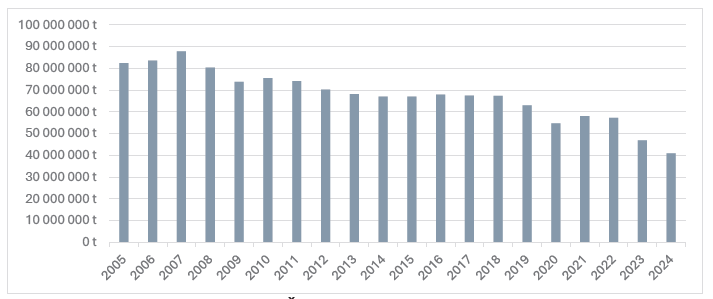The Czechia is greener, CO2 emissions drop again in 2024
Greenhouse gas emissions in the Czech Republic dropped by 13% in 2024 compared to 2023, according to data recorded in the European Union's single registry, which is administered by the Czech company OTE. The obligation to report their emissions applies to 5 aircraft operators and 147 companies operating 213 stationary installations that are part of the European Union Emissions Trading System (EU ETS) in the Czech Republic.
These emissions for 2024 in the Czech Republic amounted to 40.9 million tonnes of CO2e, a year-on-year decrease of 13%. Therefore, a long-term downward trend in emissions produced in the Czech Republic continues, as shown by the figures in the following graph representing the EU ETS emissions of CO2, N2O and PFCs in the Czech Republic since 2005.

EU ETS emissions of CO2, N2O and PFCs in the Czech Republic (total, in tonnes of CO2 equivalent)
The obligation to monitor and report their emissions of greenhouse gases emitted into the air in the previous calendar year and subsequently surrender allowances in the amount corresponding to their emissions applies specifically to operators of installations for each installation, that has been issued a permit by the Ministry of the Environment to emit greenhouse gases into the air, and aircraft operators for each aircraft that has an operating license issued in the Czech Republic or falls under the administration of the Czech Republic according to the list of aircraft operators issued by the European Commission. The European Union's single registry is used to record emissions and allowances, and the national administrator of this registry is OTE.
"The reduction in emissions in the Czech Republic last year was higher than the average reduction in Europe, which was 5%. This is due to a stronger industrial presence in the Czech economy as well as the Czech energy mix with a higher share of coal-fired power plants, which for economic reasons are used relatively less year-on-year. ", says Michal Puchel, Chairman of the Board of Directors.
The EU ETS is the cornerstone of the EU's climate policy and its key instrument for reducing greenhouse gas emissions. It was the world's first carbon market and is still one of the largest. Reducing the amount of greenhouse gases produced by companies is an important part of environmental protection, particularly climate protection.
Press release in PDF format here.
